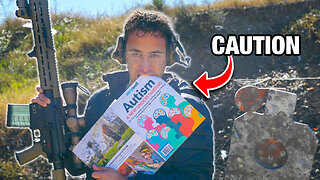Premium Only Content

Torn from the Sky
The Extraordinary Survival of Vesna Vulović
The sky over Czechoslovakia was quiet that winter afternoon on January 26, 1972. A commercial airliner, JAT Flight 367, flew calmly through the clouds, carrying twenty-eight passengers from Copenhagen to Belgrade. Among them was a 22-year-old flight attendant named Vesna Vulović, cheerful, dedicated, and full of dreams. She had joined the airline only months before, excited to see the world. But that day, fate had placed her on a flight she was never meant to be on — a small mix-up in scheduling that would lead her to the edge of the impossible.
Somewhere high above the snowy hills near the Czech border, as the plane crossed into its final leg, disaster struck. Without warning, a massive explosion tore through the fuselage. The pressure difference ripped the aircraft apart in midair, scattering metal, luggage, and bodies across the cold sky. Passengers and crew were thrown into the freezing wind at over 33,000 feet — ten kilometers above the Earth.
In that violent instant, Vesna was blown out of the cabin. Still strapped into her seat, she plummeted through the open sky, unconscious as the clouds roared around her. Below, a village lay silent in winter, its rooftops covered in snow. Witnesses would later recall hearing a deafening sound, then seeing burning fragments falling like comets.
Vesna hit the ground — not on open earth, but onto the side of a steep, snow-covered hill, where her section of the fuselage had landed at an angle, the wreckage wedged between trees. The snow cushioned part of the impact. Even so, every bone in her body should have been crushed. Yet somehow, miraculously, she was still alive.
Her injuries were catastrophic. Both legs were broken, three vertebrae were fractured, and her skull was cracked. Her ribs and pelvis were shattered, and she was bleeding internally. For hours, she lay in the wreckage, half-buried in snow, drifting between life and death. When rescuers arrived, they found her unconscious, her uniform stained with frost and blood — the only survivor out of twenty-eight souls.
She was rushed to a hospital in Prague, where doctors were certain she would not last the night. But Vesna clung to life with an unexplainable strength. She remained in a coma for several days, and when she finally woke, she couldn’t remember the crash — only fragments of faces, flashes of light, and the sound of an explosion echoing through her mind.
Her recovery was slow, grueling, and painful. She had to learn how to walk again, how to speak without pain, how to face the truth that everyone else on that flight — her friends, her passengers, her fellow crew — was gone. Yet as months turned into years, she did not grow bitter. Instead, she carried herself with quiet resilience.
The world was stunned. Investigators could hardly believe what had happened. Falling from 33,330 feet, Vesna Vulović had survived the highest free fall of any human in history without a parachute — a record that still stands today. Scientists debated how she could have lived. Some said the section of the plane she was trapped in slowed her descent. Others pointed to the deep snow and the trees that absorbed part of the impact. But Vesna believed something more — that it was not physics, but fate.
She later said, “I am not lucky. I am alive because I was meant to help others understand how precious life is.”
Despite her trauma, she returned to work for the same airline — not as a flight attendant, but in a desk position. She continued to fly as a passenger, unafraid of the sky that had once nearly claimed her. She said she refused to live in fear, because fear meant death before death arrived.
As years passed, Vesna became a symbol of survival — not only for what her body endured, but for the grace with which she carried the weight of her past. She spoke often about peace, compassion, and the strange mercy of fate. The plane that exploded had been the target of a bomb, planted by unknown terrorists during a time of political tension. But Vesna never let hate enter her heart. She said the only thing worth holding onto was gratitude.
Her story traveled around the world — the woman who fell from the heavens and lived to walk again. Scientists called it impossible. Doctors called it miraculous. Vesna called it life.
She lived quietly in Belgrade for the rest of her days, refusing fame, saying only that she had been given a second chance, and that surviving such a fall was not about strength or luck — it was about accepting that even when everything is torn apart, you can still rise again.
Her name became etched in the Guinness Book of World Records, but the true record she set was one of courage — the courage to face the sky again, to smile after unimaginable loss, and to keep living when the world thought you were gone.
In the end, her story reminds us that survival is not just about the body enduring impact, but about the spirit refusing to break. She once said, softly, “When you fall from the sky, you learn that life is the only thing that truly matters.”
-
 10:23
10:23
TheSaltyCracker
18 hours agoMuslims Immediately Threaten New Yorkers After Zohran Win
43.7K447 -
 18:40
18:40
Actual Justice Warrior
17 hours agoMamdani Pledges To DESTROY New York
30.7K73 -
 28:53
28:53
iCkEdMeL
17 hours ago $0.03 earnedBREAKING: 9 DEAD After UPS Plane BURSTS Into Fireball at Louisville Airport
35.1K7 -
 20:52
20:52
Professor Nez
20 hours agoThe TRUTH is Actually WORSE than we Thought...
24.6K23 -
 8:59
8:59
MattMorseTV
19 hours ago $0.06 earnedTrump’s DIRE WARNING to the Senate GOP.
82.7K85 -
 2:13:33
2:13:33
Side Scrollers Podcast
21 hours agoAsmongold SUED for Emotional Distress + Hasan REJECTED+ INSANE Plane Crash + More | Side Scrollers
96.2K28 -
 21:39
21:39
Nikko Ortiz
4 days agoI Take A North Korean Shooting
86.5K11 -
 23:01
23:01
GritsGG
19 hours agoWarzone Solo Dubular! Last Night Time Solo???
21K2 -
 22:47
22:47
The Pascal Show
16 hours ago $0.05 earnedTHEY’RE HIDING EVIDENCE?! Candace Owens EXPOSES Foreign Connection In Charlie Kirk Shooting
28.2K30 -
 LIVE
LIVE
Lofi Girl
3 years agolofi hip hop radio 📚 - beats to relax/study to
267 watching